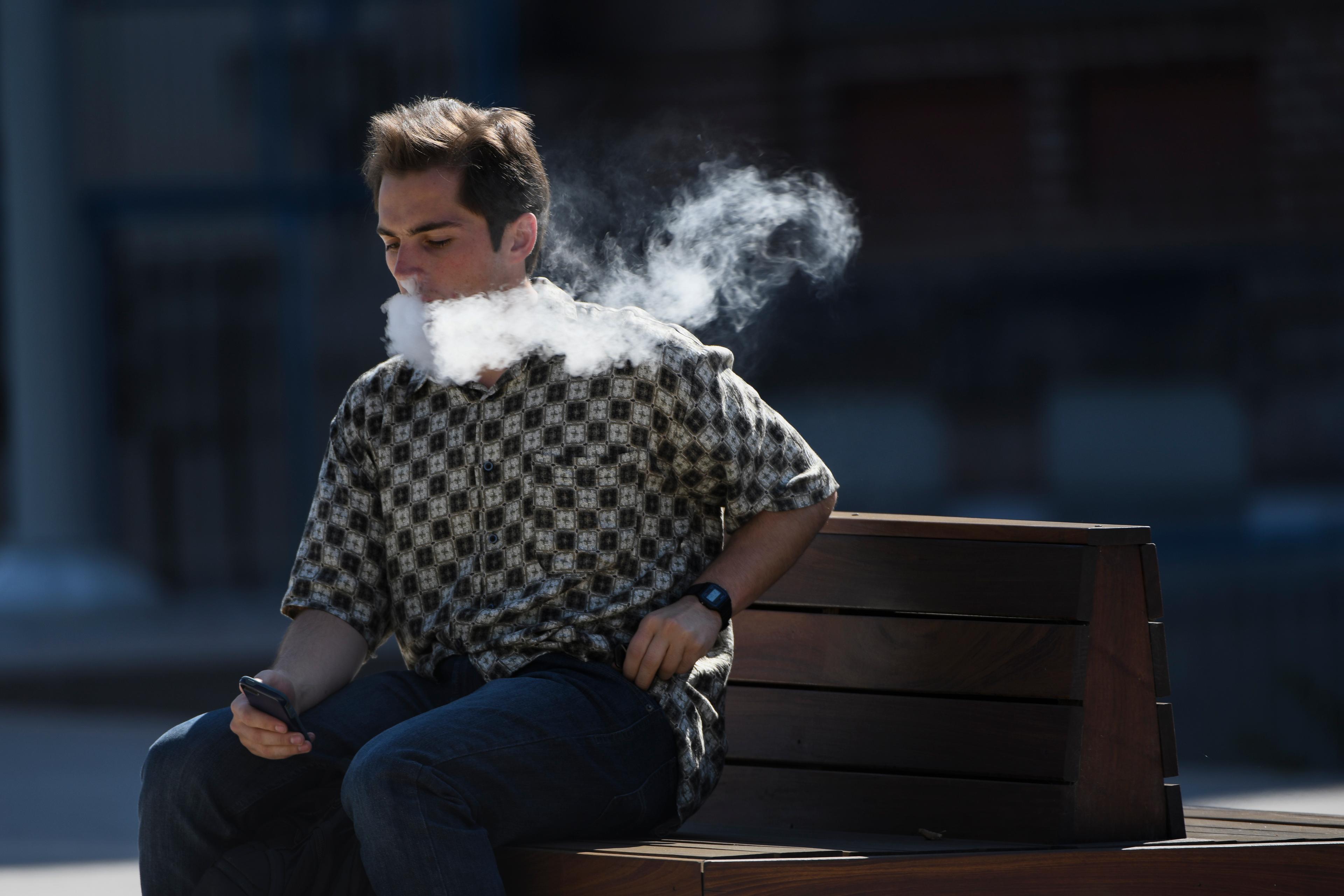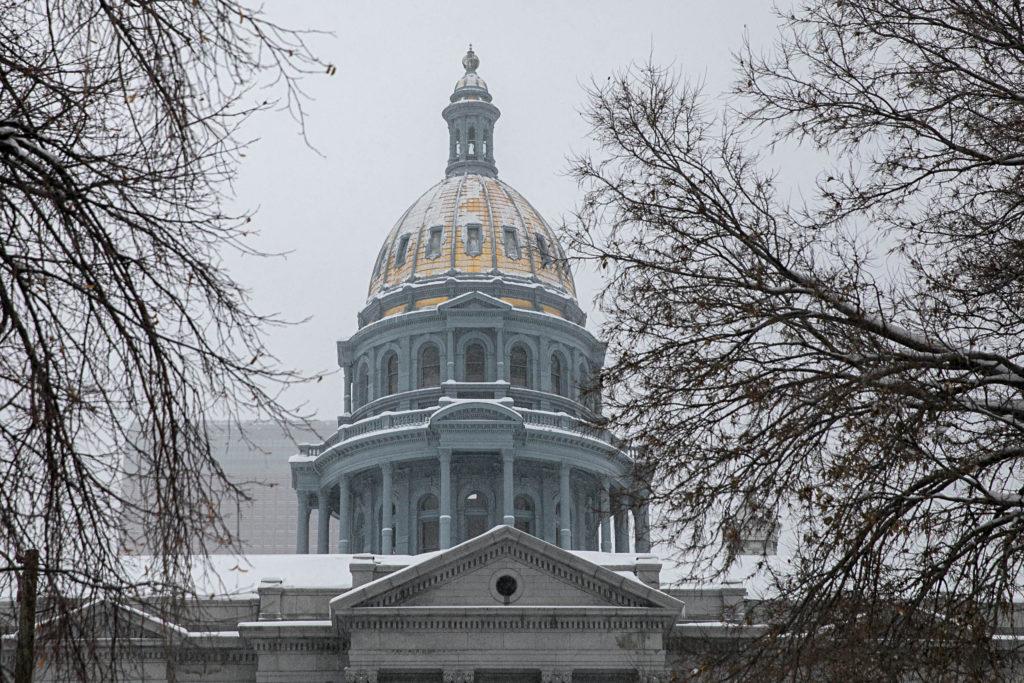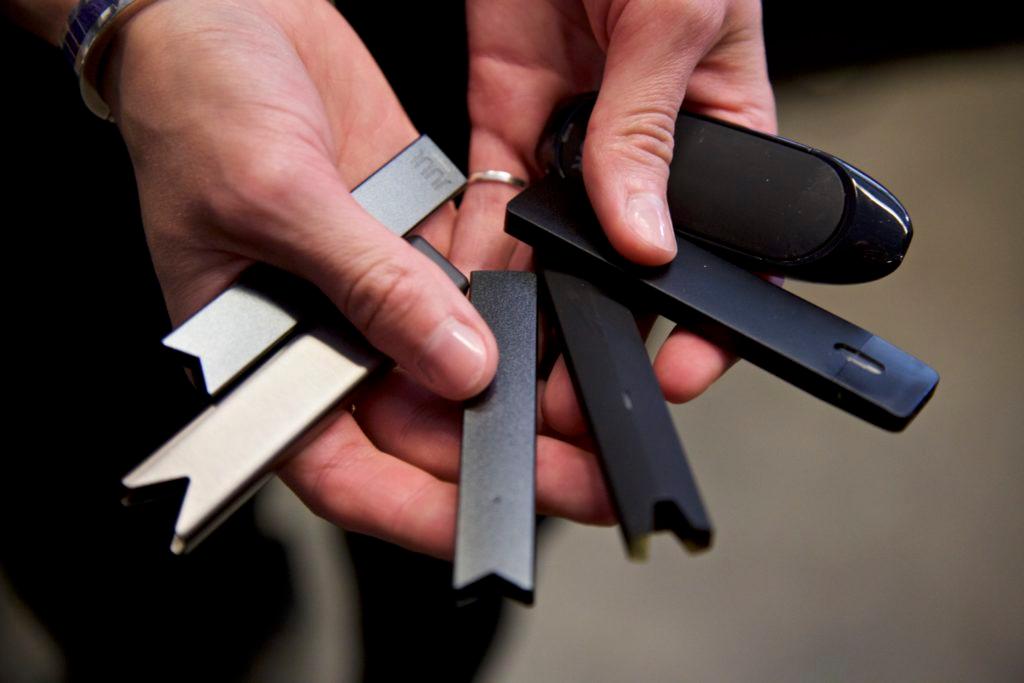
State lawmakers plan to ramp up efforts to try to reduce the teen vaping rate in Colorado in 2020 in the wake of vaping-linked illnesses that sickened 11 people in the state and thousands across the country.
In the works are proposals to increase the age to purchase tobacco products, ban flavored vaping products and raise taxes on vape devices and pods.
Vaping regulation wasn’t a main focus in the 2019 legislative session. A last-minute push by Gov. Jared Polis to refer a measure to voters to approve a hefty vaping tax and a cigarette tax increase didn’t have enough support in the Democratic-controlled General Assembly. That legislation failed.
The wave of vaping-related illnesses, as well as the growing recognition of Colorado’s youth vaping epidemic, have pushed new regulations up the priority list for legislators.
“I've seen patients as young as 11 being exposed in clinic to vaping by their classmates. Their classmates are doing it in class,“ said Democratic state Rep. Yadira Caraveo of Thornton, the only pediatrician serving in the state legislature.
Caraveo is among a bi-partisan group of lawmakers that have been discussing a package of bills that would be introduced when the legislature convenes in January.
While there is widespread support for addressing vaping, exactly how to do that could prove to be controversial.
“I think the overall conversation is how many of these can we get passed?” Caraveo asked. “We don't want to jeopardize the whole package because one part of it is controversial, so we're trying to decide how to approach that.”
The idea of banning flavored vaping products, in particular, has drawn opposition from Republicans and business groups.
“The flavor ban is a proposal which I think takes away the value, or I should say, takes away the inclination for traditional smokers to switch over to vaping, which obviously was the entire intended purpose of vaping to begin with,” said Sage Naumann, a spokesman for Senate Republicans.
Black market products such as marijuana oil cartridges containing vitamin E acetate have been linked to a number of vaping-related deaths and illnesses across the country. Industry and those who say vaping helps adults quit smoking conventional cigarettes have pushed back hard against proposed flavor bans. And vaping consumers are increasingly speaking out, with a “We Vape, We Vote” message.
Some lawmakers worry that too many restrictions on vaping products could enable a black market and leave more people using traditional tobacco.
“It has helped a lot of people quit cigarettes and eventually they quit the vaping too,” said Republican state Rep. Lori Saine of Dacono. “So I don't want to throw the baby out with the bath water because it has helped a lot of adults with smoking. My husband used it for awhile too. So I can see the benefit of it.”
Polis told Colorado Matters earlier this month that he plans to focus on a tax proposal on vaping products that would need voter approval.
“The data shows that the price point is extremely relevant and the most important factor," Polis said. "Right now there’s a loophole, they don’t pay the tobacco tax. They’re exempt.”
He has not explicitly said whether or not he would support a flavor ban.
“The governor wants to make sure that we identify solutions that are science-driven and create real change,” said Conor Cahill, a spokesman for the governor. “All data-driven options are on the table and that is what he has directed staff to look into.”
In spite of Caraveo’s worries about getting enough votes, she said she’d support a flavor ban.
“For me personally, I think a flavor ban is the right thing to do. I'm just not sure if it would pass," she said.
Democratic state Sen. Rhonda Fields of Aurora said she also backs a vaping flavor ban and aims to introduce a bill next session. She said she’s still working with stakeholders on the details.
“They’re targeting young kids and those kids think it’s harmless, but it’s really damaging the lungs of young people,” Fields said. “When you have flavors like bubble gum it’s not transparent about what it’s really doing to the body.”

Raising the purchase age for nicotine products has more support.
The fight over some of the proposed bills is expected to take place along familiar lines, with the vaping and tobacco industries, vape shops and convenience store owners and employees pitted against public health advocates and parents of teens. The two sides appear likely to disagree on tougher measures like the flavor ban or raising taxes, but seem to be finding common ground on raising the legal purchase age to 21.
Republican state Rep. Colin Larson of Ken Caryl said while he’s not likely to back a flavor ban, he is planning to co-sponsor a bipartisan bill with Democrats to increase the statewide purchase age to 21 years. He said reducing the youth vaping rate is a top priority of his.
“We’re trying to tack as close to the laws governing liquor licenses as possible so that it’s something businesses are familiar with to implement,” Larson said. “There are going to be a few deviations from that but not many.”
Republican state Sen. Kevin Priola of Henderson said he’s open to both a flavor ban and a higher purchase age.
“I think, you know, parents today are realizing that there's something bubbling up that is unique and different than what existed five or 10 years ago,” Priola said. “As policy makers, we need to be looking perspectively, at a minimum, have discussions, have to take testimony, get experts in their field, to adjust, to change, state policy.”
Polis said he’d also consider working with lawmakers to increase the purchase age to 21.
“It can be part of an overall strategy, but what I don’t want to see is that as a substitute to doing anything else," he said.
JUUL, the dominant e-cigarette manufacturer, said it favors taking action, too.
“We believe it is critical because it will prevent high-school seniors and recent high-school graduates from purchasing tobacco products and sharing them with underage users,” the company said in a statement on its website. “We know that ‘social sourcing’ — obtaining tobacco products from friends or siblings who are of legal age — is currently how a large swath of youth users access these products.”
Changes to vape regulation in the near-term will be left up to individual states and local governments.
As of September, 18 states — including other Western states like Utah, California, Oregon and Washington — have raised the legal tobacco purchase age to 21, according to the Campaign for Tobacco-Free Kids. More than 500 local Colorado governments have done the same, including Aspen, Avon, Basalt, Boulder, Carbondale, Edgewater, Glenwood Springs and Snowmass.
These laws now cover over half of the U.S. population, according to the group, though the strength of state and local laws, including enforcement and penalties, varies widely.
President Donald Trump is backing off his call for a ban on e-cigarette flavors at the national level, putting the task back in the hands of states and municipalities.
Colorado Rep. Diane DeGette has introduced legislation in the U.S. House.
Last session, Colorado lawmakers updated the clean indoor act to include vaping and clarify that local communities can have their own regulations. The appetite to take on new vaping rules has proven strong in parts of Colorado, especially mountain communities with teen rates higher than the state’s.
Earlier this month, voters in eight communities approved tobacco tax increases by robust margins. Voters OKed tax hikes in Summit, Pitkin and Eagle counties along with the city of Boulder, Crested Butte, New Castle, Vail and Glenwood Springs.
Boulder's measure set a 40 percent sales tax on vaping products. Similar measures elsewhere added up to a 40 percent sales tax on tobacco products, such as vape cartridges or chew, and some places approved an additional tax per pack of cigarettes.

The battle to come in the state Capitol is emblematic of the greater fight between public health advocates and vape businesses.
So far no one at the state legislature seems to be talking about an outright ban on the sale of e-cigarettes. But public health advocates are pushing for tobacco retailers to have to apply for a license to sell tobacco, including all vaping products, to ensure the state can identify retailers who may be selling vaping products to minors, and hold them accountable.
Right now, Colorado doesn’t require a license of any kind to sell tobacco. It’s one of only a dozen states across the country who do not have this requirement, according to public health advocates.
“It is critical that our elected officials have the political will to pass assertive policies to reverse this trend,” said Jodi Radke with the Campaign for Tobacco-Free Kids. “The bad news is that we are watching an epidemic unfold with a new generation of those addicted to tobacco, with Colorado leading the way. The good news is that we know what public policies will effectively reverse this trend.”
Radke said a fee for a license could contribute directly toward enforcement. Related compliance checks would be required to ensure retailers are not selling to kids.
Right now, the state’s Department of Revenue handles the licensing for both alcohol and marijuana. Twenty-six cities and counties in the state currently have a tobacco license requirement at the local level, Radke said.
Gregory Conley, president of the American Vaping Association, wrote an editorial in USA Today warning "get tough" measures could destroy the nicotine vaping industry. The recent bad news has led to “hysterical media coverage with a ‘ban first, ask questions later’ mentality," Conley wrote. He also said nicotine vape products have “helped several million adult smokers quit.”
“Taking away the most powerful quit-smoking tool available will create a public health crisis as Americans turn to potentially dangerous counterfeit products or return to deadly combustible cigarettes," Conley wrote.
But public health advocates insist the top priority should be using tighter state rules to prevent young people from taking up a habit that’s considered hard to quit.
“It is important that the policies being considered are evidence-based, ones that not only look and feel good, but do good,” Radke said.
As CPR News first reported, Colorado's health department is investigating and awaiting test results for what could be the state's first death due to a vaping-linked lung illness. The state recorded 11 cases in the outbreak and nine hospitalizations, as of Nov. 20.
In Colorado, the median age of those who got sick was 18. In a 2018 report from the Centers for Disease Control and Prevention, Colorado had the highest rate of teen vaping of 37 states surveyed.
Nationally, the Centers for Disease Control and Prevention reported 2,290 cases of e-cigarette-associated lung injury (also know as EVALI) as of Nov. 20. Forty-seven deaths have been confirmed. More than a quarter of U.S. students now use e-cigarettes, according to federal data released in September, as teen vaping rates rose to a new record despite efforts to rein in the epidemic.








